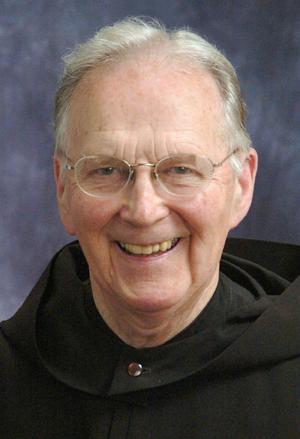
By Fr. Kilian McDonnell, OSB
Father Richard McBrien’s column taking issue with Pope Benedict’s promotion of eucharistic exposition is an old theme for him. In 2003 he criticized Pope John Paul’s encyclical “The Church of the Eucharist” on the same grounds. These columns bring to my mind the visit of Msgr. Balthazar Fischer to St. John’s University in Collegeville, Minn., for a lecture on the liturgy. This was after Vatican II.
Fischer had founded the Liturgical Institute in Trier, Germany, where a number of American liturgists were trained. Pope Paul VI had appointed Fischer as a consultant to Consilium, which was charged with the task of reforming the liturgical rites by applying the principles of The Constitution on the Liturgy. Also, Pope Paul VI appointed Fischer to a number of the council’s study groups on the liturgy.
Msgr. Fischer came to St. John’s University to lecture on the liturgy about 15 years after the Second Vatican Council. The graduate theological faculty and students were gathered in our Alumni Lounge for a wine and cheese reception in Msgr. Fischer’s honor. He held forth on his experience in the eastern United States. He had gone to a Polish parish for the celebration of a Forty Hours devotion.
He was deeply impressed and moved by the celebration, mentioning specifically the piety of the people and priests, the forceful singing of the congregation, the banks of candle, the incense. He said it was a marvelous religious experience.
Then he concluded: We priests, and especially the theologians and liturgists, will have much to answer to God for the downgrading of popular devotions. Some theologians and liturgists, he said, belittled popular devotions, including eucharistic adoration, as though the Mass and the whole of the church’s liturgical life fulfilled the people’s spiritual needs. Fr. McBrien writes that “The Mass provides all that a Catholic needs sacramentally and spiritually.”
After Vatican II Pope Paul VI saw that the important liturgical advances of the council were being interpreted as encouragement to abandon popular devotions. In 1974 he wrote “The Cult of Mary” (Marialis Cultus) on Marian devotion, but with an eye to other devotional practices. Its purpose: To counteract the trend to abandon the devotions, he enunciated biblical and liturgical guidelines to norm them. In this Apostolic Exhortation he noted “The exaggeration(s) of content and form …” which needed to be brought into harmony with the liturgy and the Word of God.
Popular devotions should be purged of excesses, not suppressed. Further, the papal documents speak of adoration outside of the eucharistic celebration as a popular extension of the adoration given within the celebration.
Abuse does not invalidate use. If abuse did validate use, then the liturgy itself would have to be judged by its abuses and abandoned.
One should rejoice in the liturgical reforms of Vatican II and the richness they brought to the life of the church. With the incorporation of biblical and patristic insights the documents of the council have set in motion a liturgical renewal. It would, indeed, be a major step backward doctrinally, theologically and spiritually, to paraphrase Fr. McBrien, were the church simply to return to the eucharistic practices of the pre-Vatican II era. The devotions, however, need a new theological context; the old one will not do. The content of the new context is the primacy of the eucharistic celebration (the Mass) and the Word of God. The devotions also need new texts and, in some cases, new forms.
If one thought of a ladder exemplifying a eucharistic hierarchy, the eucharistic celebration would be on the top rung. But down the ladder, possible on the fourth rung, would be popular devotion. They are not of first importance, but they belong on the ladder and they have their own worth.
One should remember the thousands upon thousands of vocations to marriage, the priesthood, religious life that came out of devotional Catholicism. To dismiss popular piety is to dismiss the spiritual power these old practices embodied. Papal documents warn against considering them “obsolete.”
Father Franco Magnani, an Italian professor of liturgical studies in Mantua and Padua, publishes in scholarly journals on the importance of devotions to the life of the church. He writes from a liturgical, theological and anthropological point of view. And James Martin, SJ, wrote a series of eight articles for America of a resurgence of interest in devotions in the United States.
Finally, the proposal here is not to return to the contours of pre-Vatican II life. Such a return would be seriously damaging. Rather the proposal is to reform the texts and, in some cases, the forms of popular devotions to conform to the liturgy and the Word of God as proposed by Pope Paul VI.
(Fr. Kilian McDonnell, OSB, taught for 30 years at St. John’s University in Collegeville, Minn. He is the founder and president of the Collegeville Institute for Ecumenical and Cultural Research.)








